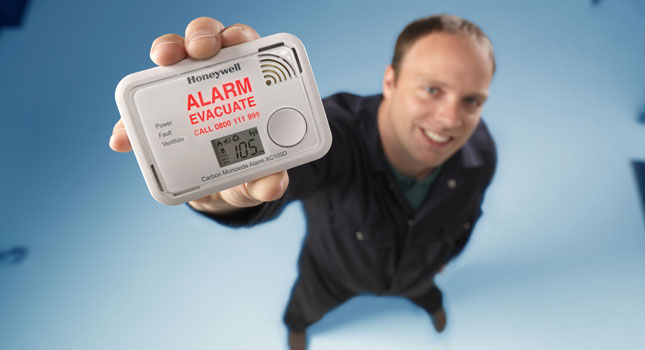

Adrian Keats explains why the CO alarm should be an essential part of every installer’s toolkit
As a busy installer, it can be tempting to just complete the task at hand then rush off to the next job. However, taking a few minutes to sell the benefits of fitting a CO alarm will not only mean additional income for your business each time they purchase a unit from you, but will also help spread awareness of the dangers of carbon monoxide (CO) poisoning.
According to figures from CO-Gas Safety, CO poisoning causes an estimated 40 deaths and 300 serious injuries annually in the UK. These figures are just the tip of the iceberg, however, as CO poisoning is often misdiagnosed because it simulates other conditions such as the flu. The true number of victims could be much higher.
For installers who are constantly interacting with the public, there is a unique opportunity to spread the word about CO safety and encourage the installation of appropriate alarms. Fitting an alarm is a five-minute job at most, so by keeping a few alarms in the back of the van, installers can quickly and easily help residents and landlords protect their property from the risks of CO.
Best practice
To remain compliant with The Smoke and Carbon Monoxide Alarm (England) Regulations 2015, landlords must install a CO alarm in any room that contains a solid-fuel burning appliance. This is the bare minimum for ensuring tenant safety. Many incidents of CO poisoning are the result of badly maintained or faulty gas appliances such as boilers or cookers, which are not specifically addressed by the legislation.
In light of this, it's best practice to recommend a CO alarm in every room housing a fuel-burning appliance, and for proper protection, an alarm in any bedroom above these, too.
While landlords may initially be reluctant to go above and beyond the regulations, an investment in tenant safety can never be a bad one, especially if they are made aware of the potentially catastrophic results of not taking the necessary precautions.
Every visit to a home, whether rented or privately owned, provides the perfect opportunity to help advise customers on other aspects of their home safety, including carbon monoxide. Not only will this add value for a homeowner, but it will also help you to easily upsell your services.
Customer safety
In a YouGov survey, conducted on behalf of Honeywell, more than three-quarters of homeowners and private renters (76%) without CO protection said they would have an alarm fitted for an affordable fee by a plumber or gas engineer who offered to do it while on a service call. A further 77% said they would follow a professional’s advice on which alarm to fit.
It’s equally vital to speak up if a customer has a low-quality alarm, or a colour spot change CO detector – as these have no audible alert and expire in a matter of months, leaving the home unprotected and its residents vulnerable. By alerting a customer to an inadequate alarm or detector, installers could genuinely be saving the lives of people who wrongly believe they’ve taken the necessary precautions.
Ultimately, alarms provide installers with an easy upsell – being a quick and simple-to-install add on when visiting a customer’s home. By recommending a high-quality, reliable system, installers can not only boost business, but help to keep UK households safer.
Adrian Keats is national account manager at Honeywell’s Home Safety business
If you'd like to keep up-to-date with the latest developments in the heating and plumbing industry, why not subscribe to our weekly newsletters? Just click the button below and you can ensure all the latest industry news and new product information lands in your inbox every week.